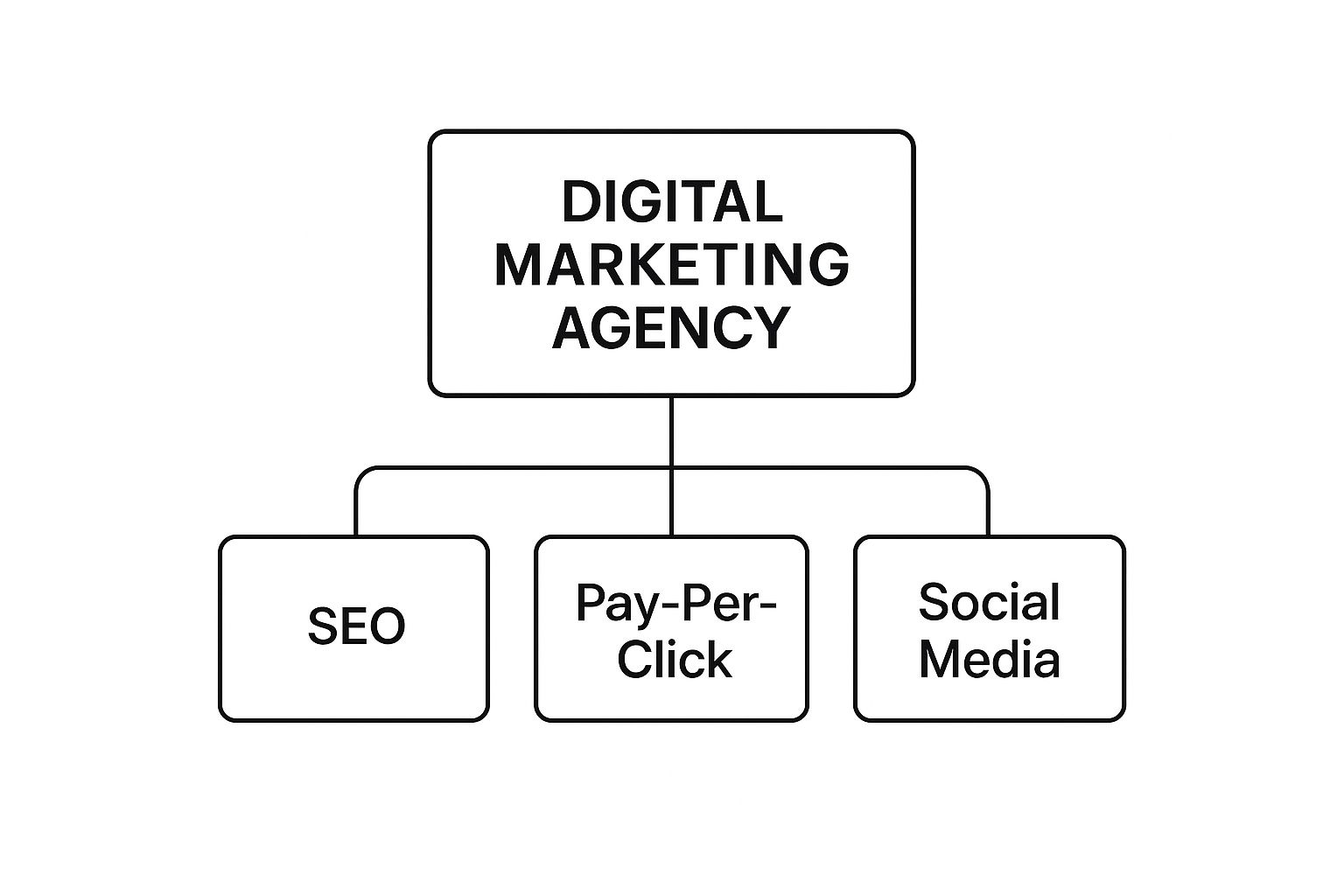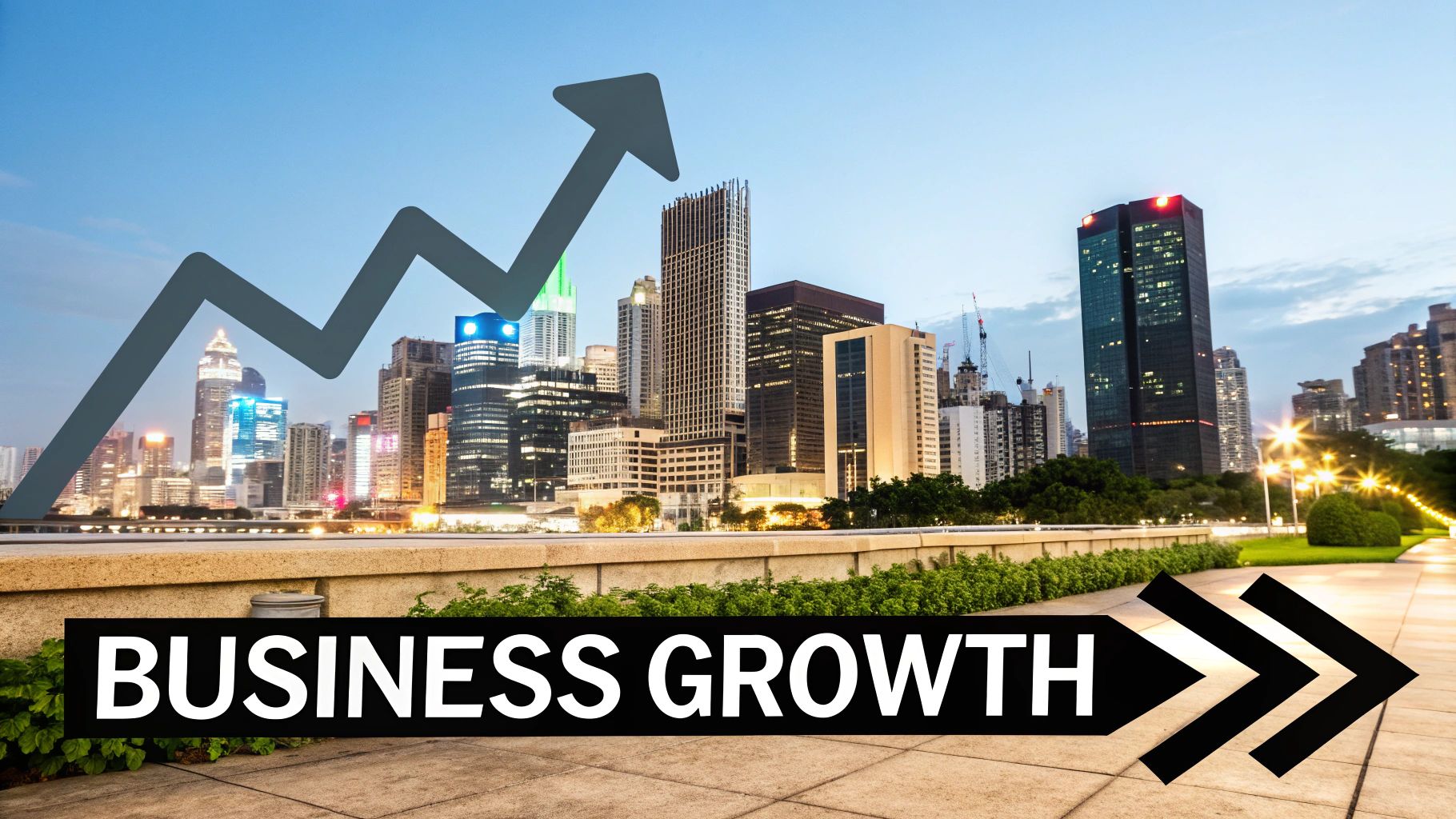Ever wonder what a digital marketing agency actually does? Put simply, it’s a company full of marketing pros who live and breathe the online world. They handle all the complex stuff—like getting you found on Google, running social media campaigns, and sending out effective emails—so you don't have to.
Think of them as your outsourced team of specialists, entirely focused on growing your business online. This lets you get back to what you do best: running your company.
Unpacking the Role of a Digital Marketing Agency
Let's try an analogy. Imagine your business is a high-performance race car. You’re the driver, focused on crossing the finish line by delivering an amazing product or service. A digital marketing agency is your expert pit crew.
You wouldn't expect a single person to refuel the car, change the tires, and tune the engine all at once, would you? The same goes for marketing. The agency brings in a whole team of specialists who work in sync to keep you ahead of the competition.
A Unified Team for Digital Growth
This "pit crew" is a mix of different experts, all of whom you get access to without the headache of hiring them one by one. A good agency brings together:
- Strategists: The big-picture thinkers who create the roadmap and make sure every marketing dollar is spent wisely.
- Content Creators: The storytellers—writers, designers, and videographers who craft compelling content that resonates with your customers.
- SEO Specialists: The technical wizards who get your website climbing the ranks on search engines like Google, bringing in valuable organic traffic.
- Paid Media Experts: The ad gurus who manage your budget on platforms like Facebook and Google Ads to drive immediate leads and sales.
- Data Analysts: The number crunchers who dive into the data, track what’s working, and pinpoint opportunities to get even better results.
This integrated approach is the secret sauce. When you have all these experts under one roof, their efforts amplify each other. Your SEO improves your ad campaigns, your content fuels your social media, and everything just works better together.
The proof is in the numbers. The average annual revenue growth for digital agencies has been 12% over the last five years, easily outpacing the broader market. This boom is happening because more and more businesses realize they need specialized expertise to navigate the modern marketplace. You can dig deeper into these trends in this comprehensive digital agency report.
Ultimately, partnering with an agency lets you tap into a deep well of knowledge without the massive expense and time it takes to build a full-scale marketing department from the ground up.
The Core Services That Drive Business Growth
A digital marketing agency is much more than a single service provider. It’s a team of specialists who bring different skills to the table, all working in concert to grow your business online. Think of it like a general contractor building a house—you have plumbers, electricians, and carpenters, and the contractor ensures they all work together to create a solid, functional home.
These core services are the building blocks of any effective digital strategy.
As you can see, disciplines like SEO, PPC, and social media marketing are individual specialties, but their real power is unlocked when an agency weaves them together toward a common goal.
To give you a clearer picture, this table breaks down the most common services you'll encounter.
At-a-Glance Guide to Core Digital Marketing Services
| Service | Primary Goal | Common KPI |
|---|---|---|
| Search Engine Optimization (SEO) | Increase organic visibility in search results to attract long-term, qualified traffic. | Organic Traffic, Keyword Rankings |
| Pay-Per-Click (PPC) Advertising | Drive immediate, targeted traffic and leads through paid ads on search and social platforms. | Cost Per Click (CPC), Conversion Rate |
| Content Marketing | Build authority, trust, and brand loyalty by creating and sharing valuable information. | Engagement Rate, Time on Page |
| Social Media Marketing | Engage with a community, build brand awareness, and drive traffic through social platforms. | Follower Growth, Reach, Clicks |
| Email Marketing | Nurture leads and retain customers through direct, personalized communication. | Open Rate, Click-Through Rate (CTR) |
This is just a starting point, but it shows how each service aims for a specific outcome, measured by its own set of metrics. Now, let’s dig a little deeper into the big three.
Search Engine Optimization (SEO)
At its heart, SEO is the craft of making your website easy for search engines like Google to find and favor. When someone searches for a product or service you offer, the goal of SEO is to get your business to show up at the top of the list. It’s not about quick wins or temporary tricks; it’s a long-game strategy focused on earning trust and authority online.
A good agency tackles this from multiple angles:
- Technical SEO: Ensuring your website is built on a solid foundation so search engine crawlers can read and index it without any issues.
- Content Creation: Developing genuinely helpful articles, guides, and pages that answer the questions your ideal customers are asking.
- Authority Building: Earning backlinks (links from other websites) to signal to Google that your site is a credible source of information.
Imagine a local flower shop. An agency's SEO work would focus on getting them to rank for searches like "wedding florist in [City Name]" or "same-day flower delivery," connecting them directly with customers who are ready to buy.
Pay-Per-Click (PPC) Advertising
While SEO is the marathon, PPC is the sprint. It’s a way to get your business in front of potential customers almost instantly. With PPC, you bid to have your ads appear at the top of search results or in social media feeds, and you only pay when someone actually clicks on your ad.
This is an incredibly powerful tool for generating leads and sales right out of the gate. An agency's job is to manage your ad budget wisely—designing ads that grab attention, targeting them to the right people, and constantly refining the campaigns to squeeze the most value out of every dollar spent.
Content and Social Media Marketing
Content marketing is all about becoming a trusted resource, not just a seller. By creating valuable blog posts, videos, or tutorials, you build a relationship with your audience and position your brand as an expert. This content is the fuel for your social media engine.
An agency uses that content to start conversations and build a community around your brand on platforms where your customers hang out. This area is booming, with social media ad spending projected to climb by 12% globally next year. What’s more, 59% of marketers are planning to lean more heavily on influencers, which makes sense when you see that 76% of consumers say social media content has swayed their purchasing decisions.
A great agency won't just post randomly. They develop a cohesive multi-channel marketing strategy to make sure your brand's voice and message are consistent everywhere your customers see you.
While each of these services is effective on its own, an agency's real magic is in making them work together. A strong content piece can boost your SEO rankings, which can then be promoted with PPC ads and shared on social media. This integration creates a growth cycle where each part makes the others stronger—the hallmark of a truly effective digital strategy.
How Agencies Weave AI and Technology into Their Work
The digital marketing agency of today is a tech-powered growth machine. Long gone are the days of relying purely on gut feelings. Instead, modern agencies use sophisticated tools and Artificial Intelligence to make sharper, faster, and more impactful decisions for their clients.
Think of AI as a superpower for a marketing team. It can churn through enormous datasets in seconds, uncovering patterns and opportunities a human might take weeks to find. This completely changes how agencies build ad campaigns, communicate with customers, and so much more.
For instance, an agency can use an AI tool to predict which ad creative will resonate most with an audience. It can even pinpoint the exact right moment to send a marketing email to a specific person. This shifts strategy from educated guesswork to precise, data-backed execution.
Driving Efficiency with Automation
One of the most immediate wins from technology is automation. Agencies use specialized software to take over repetitive, time-sucking tasks. This frees up their human experts to focus on what they do best: high-level strategy and creative problem-solving.
Here are a few common tasks agencies automate:
- Social Media Scheduling: Planning and publishing posts across multiple platforms without manual effort.
- Email Sequences: Automatically sending a series of personalized emails to new leads or customers.
- Performance Reporting: Pulling data from different sources into a single, clean dashboard, all done automatically.
This focus on efficiency means more of your marketing budget is spent on activities that actually move the needle. By staying on top of the latest trends and inspiration in marketing technology, agencies keep their clients ahead of the curve.
Personalizing Experiences at Scale
Perhaps the most powerful use of AI is in personalization. People today expect messages that feel like they were written just for them. Technology makes this possible, even for massive audiences. AI tools help agencies understand individual customer behavior and deliver truly tailored experiences.
For example, an agency can use AI to analyze a visitor's browsing history on an online store. It can then show them ads for products they've viewed or are most likely to buy. This kind of personalization dramatically increases conversion rates and improves your return on investment.
The industry is all-in on this tech. Recent investment trends show 71% of marketers are planning to sink at least $10 million into AI technologies over the next three years. That’s a huge jump from 57% in the previous year. This rapid adoption shows AI isn't just a buzzword anymore—it's a fundamental part of how modern agencies operate.
The Strategic Advantages of Hiring an Agency
One of the biggest crossroads for any growing business is deciding whether to build a marketing team in-house or partner with an agency. While having your own team gives you a sense of direct control, the strategic benefits of bringing in an agency often create a much more powerful and efficient path to growth.
Think about what it takes to build a modern marketing team from scratch. You'd need an SEO specialist, a PPC manager, a content writer, and a social media strategist, just for starters. The recruitment costs alone are significant, not to mention the salaries and benefits for even one senior marketer. An agency instantly gives you the collective brainpower of an entire team of specialists, often for a fraction of that cost.
Gaining a Competitive Edge with Specialized Knowledge
The world of digital marketing moves incredibly fast. Google updates its algorithm, a new social platform takes off, and ad strategies change what feels like every other week. For an in-house team, just keeping up with these shifts can become a full-time job. Agencies, on the other hand, live and breathe this stuff. Their success literally depends on staying ahead of the curve.
This means you get a direct pipeline to:
- Up-to-the-minute strategies: Agencies are constantly testing new tools and tactics, so you benefit from what's working right now.
- Cross-industry insights: They work with clients in all sorts of different sectors, which means they see what’s succeeding in other markets and can apply those lessons to your business.
- Access to powerful tools: Agencies invest heavily in enterprise-level software for analytics, research, and automation—tools that are often too expensive for a single company to justify.
Partnering with an agency is like plugging your business directly into a current of constant innovation. You get a team that isn't just checking off a to-do list; they're actively working to future-proof your marketing so you're ready for what's coming next. It’s a proactive approach that keeps you miles ahead of competitors who are still trying to figure it all out on their own.
Cost-Effectiveness and Scalability
Hiring an agency isn't just another line item on your budget; it's a strategic investment in efficiency. You completely sidestep all the overhead that comes with full-time employees—things like benefits, training, new hardware, and office space. The financial model is just cleaner, more predictable, and often delivers a much stronger return on your investment.
Even better, agencies offer unmatched scalability. Let's say your business suddenly takes off, or you decide to launch a massive campaign. An agency can instantly scale up its resources to meet that new demand without missing a beat. There's no need to rush through a months-long hiring process. On the flip side, if you need to pull back for a bit, you can simply adjust your retainer without the difficult process of downsizing an internal team.
This kind of flexibility allows you to be incredibly nimble. You can pour resources into your marketing during peak seasons and dial it back during slower periods, making sure every single dollar is working as hard as it possibly can. It’s a model built for smart, sustainable growth.
How to Choose the Right Agency for Your Business
Picking a digital marketing agency is a big deal. It’s not like choosing an office supplier; it’s about finding a partner who can genuinely steer your company's growth. The right choice can be a game-changer, while the wrong one can set you back months, or even years.
Before you even start looking, you need to get your own house in order. Start by defining what success actually means for your business. Generic goals like "getting more traffic" just won't cut it. You need something concrete.
Are you trying to boost online sales by 25%? Or maybe you need to generate 100 high-quality leads every month? These are the kinds of specific, measurable targets a great agency can sink its teeth into.
Just as important is knowing your budget. Being upfront about what you can realistically invest allows an agency to build a strategy that makes sense for you. This clarity avoids wasted time and sets everyone up for success from the get-go.
Vetting Potential Partners
With your goals and budget clearly defined, it’s time to start the search. This is where you separate the real experts from those who just talk a good game. A flashy presentation means nothing without proof to back it up.
You need to roll up your sleeves and dig into their track record. Here’s what to look for:
- Case Studies and Testimonials: Don't just skim them. Look for detailed stories that show the problem, the agency's strategy, and the actual, measurable results. Bonus points if they've worked with businesses like yours.
- Client Portfolio: Take a look at their current and past clients. Is the work they're producing high-quality? Do the websites they’ve built look professional and function smoothly? This is a direct reflection of their standards.
- Industry Specialization: Some agencies do a little bit of everything, while others are masters of a specific niche, like e-commerce or B2B SaaS. A specialist often brings a level of insight that a generalist simply can't match.
Getting this part right is crucial for gauging what an agency is truly capable of. For more on this, especially if a new website is on your radar, this guide on how to choose a web design agency is incredibly helpful.
Asking the Right Questions
Once you've narrowed down your list to a few strong contenders, it's time to talk. Treat these conversations like a job interview, because that’s essentially what they are. You're looking for strategic minds, transparent processes, and a team that genuinely clicks with yours.
Don't just ask what they do; ask them how they do it. A great agency will be eager to walk you through their process, from initial strategy sessions to monthly performance reporting. They should be able to explain their approach in a way that you can easily understand.
Come prepared with a list of pointed questions to guide the conversation.
- How will you measure success for my campaign? Their answer should tie directly back to your business goals. Look for specific Key Performance Indicators (KPIs), not vague promises.
- Who will be my main point of contact? Knowing who you’ll be working with day-to-day is essential for a productive relationship.
- What does your client onboarding process look like? A well-defined onboarding process is a tell-tale sign of an organized, professional operation.
Listen carefully not just to what they say, but how they say it. A true partner will be genuinely curious about your business, open about their methods, and committed to building a relationship founded on trust and shared success.
Common Questions About Digital Marketing Agencies
Even with all the benefits laid out, it's totally normal to have a few lingering questions before you sign on the dotted line. Partnering with a digital marketing agency is a big move and a serious investment. You need to feel confident you're making the right call.
To help you get there, let's walk through some of the most common questions that pop up in those first conversations. Getting these answers straight will give you the clarity you need to size up potential partners and set yourself up for a great collaboration.
How Much Does It Cost to Hire a Digital Marketing Agency?
This is usually the first thing people ask, and the honest answer is: it really depends. The price tag for an agency can swing wildly based on how much help you need, the agency's size and reputation, and what you’re trying to achieve.
Most agencies you’ll talk to use one of three main pricing models:
- Monthly Retainer: This is the most popular setup. You pay a set fee each month for an agreed-upon list of services. Retainers can start around $1,000 for something specific like basic SEO or social media, but can easily climb past $10,000 for a full-blown, multi-channel strategy.
- Project-Based Fees: Got a one-off project in mind? Maybe a total website overhaul or a big product launch? A project-based fee is perfect for this. The agency will quote you a single, flat price for the whole thing.
- Hourly Rates: Some agencies will bill by the hour, typically somewhere in the $150 to $250 per hour range. This works best for smaller, well-defined tasks or if you just need some strategic consulting.
Any agency worth its salt will give you a crystal-clear proposal that breaks down every single cost. No hidden fees, no surprises.
How Long Does It Take to See Results?
I get it, you want results yesterday. But in digital marketing, patience is part of the game. The timeline really hinges on the specific services you're using. Not everything delivers instant gratification, and a good partner will be upfront about what to expect and when.
For instance, a Pay-Per-Click (PPC) advertising campaign can start driving traffic and leads almost the second it's switched on. You get that immediate visibility.
On the flip side, Search Engine Optimization (SEO) is a marathon, not a sprint. You're building a foundation of trust with search engines, and that takes time. You should generally expect to see real, meaningful jumps in organic traffic after four to six months of solid, consistent work.
A trustworthy agency will lay out a roadmap with clear milestones so you know exactly what to look for along the way.
What Should I Prepare Before Contacting an Agency?
Want to make that first call incredibly productive? A little homework goes a long way. When you walk in with a solid grasp of your own business, an agency can start brainstorming a real strategy for you right from the get-go.
Before you pick up the phone or send that email, try to get these things sorted out:
- Your Business Goals: Get specific. "More traffic" is vague. "Increase online sales by 20% in the next year" is a goal an agency can build a plan around.
- Your Target Audience: Who are you trying to reach? The more detail you can share about your ideal customer, the better.
- A Realistic Budget: You need to know what you can comfortably invest. This helps the agency propose a plan that's actually feasible for you.
- Past Marketing Efforts: Be ready to talk about what you’ve tried before. What worked? What was a total flop? Every bit of history helps.
If you can, giving them access to your website analytics is a huge head start. It gives them a real look under the hood at what's happening right now.
Do I Still Need an In-House Marketer?
This might seem counterintuitive, but hiring an agency doesn't always mean your in-house marketing person is redundant. In fact, some of the most successful partnerships I've seen involve a hybrid approach.
Think of an in-house marketing manager as the perfect bridge between your company and the agency. They become the day-to-day point person, making sure the agency’s strategy is perfectly in step with your internal plans.
This person handles approvals, provides essential brand guidance, and weaves the agency's work into what your sales and customer service teams are doing. This creates a powerful, seamless partnership where everyone is pulling in the same direction.
Ready to stop guessing and start growing? Sugar Pixels provides the expert web design, SEO, and digital marketing strategies you need to scale your business online. Discover our tailored solutions at https://www.sugarpixels.com.



